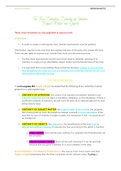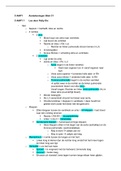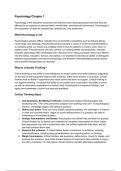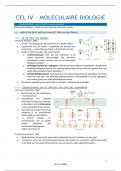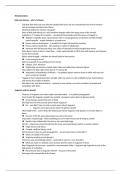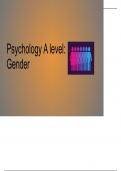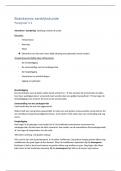EQUITY & TRUSTS REVISION NOTES
*Note: these formalities are only applicable to express trusts.
OVERVIEW:
• In order to create a valid express trust, several requirements must be satisfied.
! Remember: express trusts arise from the express intention of the party who creates the trust.
There are two types of express trust, namely fixed trusts and discretionary trusts.
• The first three requirements revolve around the need to establish certainty of an
intention to create a trust, identifiable subject matter and the beneficiaries of the trust.
• It is important that a trust satisfies these certainties because: trustees must know what
their obligations are under the trust; and satisfying the certainties ensures that the court
will be able to administer the trust.
THE THREE CERTAINTIES:
⇒ Lord Langdale MR, Knight v Knight: he stated that the following three certainties must be
present for a valid express trust.
1. CERTAINTY OF INTENTION: the creator of an express trust (settlor/ testator) must
intend to create the trust (i.e. place a mandatory obligation on the transferee). If there is
insufficient certainty of intention, the gift it will be taken as an absolute gift and no trust
will be held to exist.
2. CERTAINTY OF SUBJECT MATTER: the subject matter of the trust (i.e. the property
that is being held on trust/ the beneficial interest involved) must be identifiable. If the
trust fails for lack of certainty of subject matter, the transaction is null – no property will
be transferred.
3. CERTAINTY OF OBJECTS: the objects (i.e. the beneficiaries) of the trust must be
defined with sufficient certainty to execute the trust according to the settlor’s intention.
→ FIXED TRUSTS: there will be such certainty if a complete list of beneficiaries can
be compiled.
→ DISCRETIONARY TRUSTS: there will be such certainty if it can be said with
certainty that any given individual is/ is not a member of the class.
⇒ OT Computers v First National Tricity Finance: this case (a much more recent case than
Knight v Knight) emphasises that the three certainties remain relevant today. Pumfrey J
,EQUITY & TRUSTS REVISION NOTES
specifically stated that there must a ‘certainty of words, certainty of subject matter and certainty
of objects.’
⇩
1. CERTAINTY OF INTENTION:
WHAT IS THE CONSEQUENCE OF UNCERTAINTY OF INTENTION?
• The gift will be taken as an absolute gift and no trust will be held to exist.
(i) THE SETTLOR MUST HAVE HAD THE CAPACITY TO CREATE THE TRUST:
• An intention will be valid only if the settlor/ testator had the capacity to create a trust.
• For example, a trust made by a child nor a mentally incapacitated individual will be void,
as they lack the ability to determine whether a trust should be created.
(ii) THE SETTLOR’S INTENTION TO CREATE THE TRUST MUST BE CERTAIN:
• There are several factors to be taken into account when establishing whether the settlor/
testator had an intention to create a trust (rather than, for example, simply make a gift).
A. ESSENTIAL TEST:
• The essence of the requirement is that the creator of the trust had the intention to place
a mandatory obligation on the transferee (put simply, whether they wanted to place a
duty upon someone to hold the property for the benefit of another person).
• This intention can be oral or in writing (Moore v Williamson) unless the intention involves
land (where it will be subject to the formalities under section 52(1)(b) of LPA 1925) or a
subsisting equitable interest (where it will be subject to section 52(1)(c) of LPA 1925).
B. USE OF THE WORD ‘TRUST’:
• A trust can be created without specifically using the word ‘trust.’
⇒ Re Kayford Ltd: a mail order company was in financial difficulty and used a separate bank
account to deposit money received from customers whose goods had not yet been delivered.
When the company became insolvent, the question was whether the money in that account was
held on trust for the customers. It was held that despite the word ‘trust’ not being used, a trust
had been created.
• Similarly, the use of the word trust will not automatically indicate the existence of an
intention to create a trust:
, EQUITY & TRUSTS REVISION NOTES
⇒ Tito v Waddell: the British colonized an island that was rich in natural resources. They stated
that they would hold the profits they make out of these resources on trust for the indigenous
population. However, the court held that the use of such words did not guarantee their
intention to bind themselves with a mandatory obligation.
⇒ Twinsectra v Yardley: House of Lords stated that using the word ‘trust’ does not automatically
mean that one was created.
⇒ Re Freud: the use of the phrase ‘as trustees’ does not automatically mean there was an
intention to create a trust.
• Instead, the intention must be deduced from the use of language as a whole that makes
it clear that the recipient/ trustee does not hold the property for his own benefit, but for
the benefit of others.
C. PRECATORY WORDS:
! Precatory words or phrases: “you may”; “I hope”; “you shall”; “I am sure you will.”
• Previously, precatory phrases, if used by the settlor or testator, would be sufficient to
create a trust by way of indicating there was certainty of intention.
• However, they implied a purely moral obligation, instead of signifying a lack of intention
to impose a legally binding obligation. Thus, the law was changed.
⇒ Re Adams v Kensington Vestry: this was a turning point for the law in this area. In this case,
the settlor had used the precatory phrase “in full confidence that she will do what is right.” The
Court of Appeal held that precatory words were insufficient to give rise to a trust and
recognised that older authorities had gone too far in holding that they could be sufficient.
• Consequently, precatory words can now only be taken into account as mere evidence
used to discover an intention to create a trust.
⇒ Re Steele’s WTs: however, in this case, precatory words were sufficient to create a trust. A
mother left her diamond necklace to her son by will, which contained a clause intending to
make the necklace a family heirloom. The form of words she used in this clause was copied from
the will of an earlier case, where those exact words were effective to create a trust. The judge
held that although subsequent cases had established that mere precatory words were not
sufficient to establish a trust, the fact that the woman used the exact form of words as in a case
where they were sufficient to establish a trust afforded a strong indication that there was an
intention to create a trust.
• Therefore, whether a trust is intended is always a question of interpretation of the
wording of the document (the instrument purporting to create a trust).
• Note that mandatory phrases/ imperative wording conveys a mandatory obligation and
thus, an intention to create a trust: “you will”; “you shall”; “you must.”
*Note: these formalities are only applicable to express trusts.
OVERVIEW:
• In order to create a valid express trust, several requirements must be satisfied.
! Remember: express trusts arise from the express intention of the party who creates the trust.
There are two types of express trust, namely fixed trusts and discretionary trusts.
• The first three requirements revolve around the need to establish certainty of an
intention to create a trust, identifiable subject matter and the beneficiaries of the trust.
• It is important that a trust satisfies these certainties because: trustees must know what
their obligations are under the trust; and satisfying the certainties ensures that the court
will be able to administer the trust.
THE THREE CERTAINTIES:
⇒ Lord Langdale MR, Knight v Knight: he stated that the following three certainties must be
present for a valid express trust.
1. CERTAINTY OF INTENTION: the creator of an express trust (settlor/ testator) must
intend to create the trust (i.e. place a mandatory obligation on the transferee). If there is
insufficient certainty of intention, the gift it will be taken as an absolute gift and no trust
will be held to exist.
2. CERTAINTY OF SUBJECT MATTER: the subject matter of the trust (i.e. the property
that is being held on trust/ the beneficial interest involved) must be identifiable. If the
trust fails for lack of certainty of subject matter, the transaction is null – no property will
be transferred.
3. CERTAINTY OF OBJECTS: the objects (i.e. the beneficiaries) of the trust must be
defined with sufficient certainty to execute the trust according to the settlor’s intention.
→ FIXED TRUSTS: there will be such certainty if a complete list of beneficiaries can
be compiled.
→ DISCRETIONARY TRUSTS: there will be such certainty if it can be said with
certainty that any given individual is/ is not a member of the class.
⇒ OT Computers v First National Tricity Finance: this case (a much more recent case than
Knight v Knight) emphasises that the three certainties remain relevant today. Pumfrey J
,EQUITY & TRUSTS REVISION NOTES
specifically stated that there must a ‘certainty of words, certainty of subject matter and certainty
of objects.’
⇩
1. CERTAINTY OF INTENTION:
WHAT IS THE CONSEQUENCE OF UNCERTAINTY OF INTENTION?
• The gift will be taken as an absolute gift and no trust will be held to exist.
(i) THE SETTLOR MUST HAVE HAD THE CAPACITY TO CREATE THE TRUST:
• An intention will be valid only if the settlor/ testator had the capacity to create a trust.
• For example, a trust made by a child nor a mentally incapacitated individual will be void,
as they lack the ability to determine whether a trust should be created.
(ii) THE SETTLOR’S INTENTION TO CREATE THE TRUST MUST BE CERTAIN:
• There are several factors to be taken into account when establishing whether the settlor/
testator had an intention to create a trust (rather than, for example, simply make a gift).
A. ESSENTIAL TEST:
• The essence of the requirement is that the creator of the trust had the intention to place
a mandatory obligation on the transferee (put simply, whether they wanted to place a
duty upon someone to hold the property for the benefit of another person).
• This intention can be oral or in writing (Moore v Williamson) unless the intention involves
land (where it will be subject to the formalities under section 52(1)(b) of LPA 1925) or a
subsisting equitable interest (where it will be subject to section 52(1)(c) of LPA 1925).
B. USE OF THE WORD ‘TRUST’:
• A trust can be created without specifically using the word ‘trust.’
⇒ Re Kayford Ltd: a mail order company was in financial difficulty and used a separate bank
account to deposit money received from customers whose goods had not yet been delivered.
When the company became insolvent, the question was whether the money in that account was
held on trust for the customers. It was held that despite the word ‘trust’ not being used, a trust
had been created.
• Similarly, the use of the word trust will not automatically indicate the existence of an
intention to create a trust:
, EQUITY & TRUSTS REVISION NOTES
⇒ Tito v Waddell: the British colonized an island that was rich in natural resources. They stated
that they would hold the profits they make out of these resources on trust for the indigenous
population. However, the court held that the use of such words did not guarantee their
intention to bind themselves with a mandatory obligation.
⇒ Twinsectra v Yardley: House of Lords stated that using the word ‘trust’ does not automatically
mean that one was created.
⇒ Re Freud: the use of the phrase ‘as trustees’ does not automatically mean there was an
intention to create a trust.
• Instead, the intention must be deduced from the use of language as a whole that makes
it clear that the recipient/ trustee does not hold the property for his own benefit, but for
the benefit of others.
C. PRECATORY WORDS:
! Precatory words or phrases: “you may”; “I hope”; “you shall”; “I am sure you will.”
• Previously, precatory phrases, if used by the settlor or testator, would be sufficient to
create a trust by way of indicating there was certainty of intention.
• However, they implied a purely moral obligation, instead of signifying a lack of intention
to impose a legally binding obligation. Thus, the law was changed.
⇒ Re Adams v Kensington Vestry: this was a turning point for the law in this area. In this case,
the settlor had used the precatory phrase “in full confidence that she will do what is right.” The
Court of Appeal held that precatory words were insufficient to give rise to a trust and
recognised that older authorities had gone too far in holding that they could be sufficient.
• Consequently, precatory words can now only be taken into account as mere evidence
used to discover an intention to create a trust.
⇒ Re Steele’s WTs: however, in this case, precatory words were sufficient to create a trust. A
mother left her diamond necklace to her son by will, which contained a clause intending to
make the necklace a family heirloom. The form of words she used in this clause was copied from
the will of an earlier case, where those exact words were effective to create a trust. The judge
held that although subsequent cases had established that mere precatory words were not
sufficient to establish a trust, the fact that the woman used the exact form of words as in a case
where they were sufficient to establish a trust afforded a strong indication that there was an
intention to create a trust.
• Therefore, whether a trust is intended is always a question of interpretation of the
wording of the document (the instrument purporting to create a trust).
• Note that mandatory phrases/ imperative wording conveys a mandatory obligation and
thus, an intention to create a trust: “you will”; “you shall”; “you must.”

